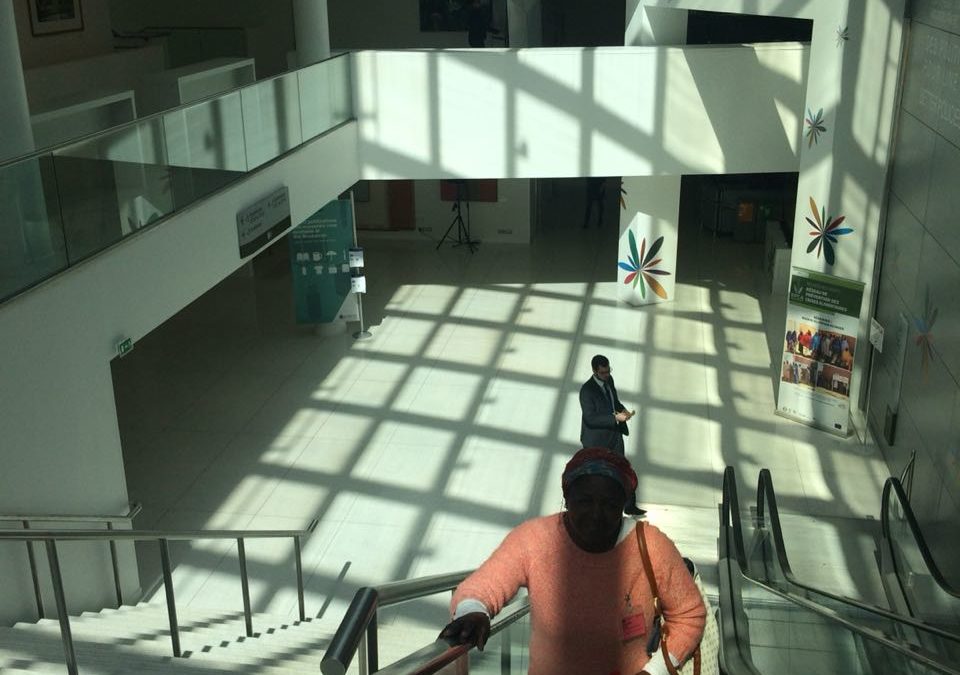Senides Lucumi, women leader and mineral selector from Suárez, Colombia. She flew to France to talk about gendering in ASM in her territory.
The Alliance for Responsible Mining (ARM) attended the 12th OECD Forum on Responsible Mineral Supply Chains from 17-19 April 2018 in Paris. More than 1000 stakeholders from all over the world explored and interchanged ideas related to responsible sourcing, due diligence, supply chains and company risk mitigation, among others. ARM contributed to these debates in three different spaces:
Women miners and leaders from Colombia and Guyana sharing empowerment experiences from their territories
Senides Lucumi, a mineral selector and member of the “Asociación de Mujeres Seleccionadoras y Luchadoras por la Paz del Municipio de Suárez (ASOMUSELUPAZ)”, traveled all the way from Colombia to participate in the forum. The OECD invited Senides, a beneficiary of ARM’s CAPAZ program, to participate in the country-level discussion about Colombia, where she represented artisanal women miners, together with Urica Primus from the Guyana Women Miners Organization.
Senides contributed with her knowledge on gender and the mineral selector activity in her territory. She highlighted the improvement in their work after being recognized as subsistence miners, thanks to the support of institutions such as the Municipality and ARM. She also proudly presented the achievement of having established a women mineral selectors organization with her partners to increase opportunities to access legal markets with better commercial conditions.
Artisanal gold and responsible sourcing initiatives
“We need a paradigm change in the artisanal gold sector. Stop seeing ASM miners as tax evaders and rather consider them as major employment generators creating value that gets transformed into foreign currency reinjected into their countries”.

In the session “Gold as a currency and related challenges for responsible sourcing”, which was attended by more than 150 people, Patrick Schein, ARM’s co-founder and member of its board of directors, presented the results of ARM’s study of artisanal gold supply chains in Burkina Faso and Senegal (available here).
He demonstrated that the informality of the artisanal gold trade in Burkina Faso is mainly due to the use of the yellow metal as a currency that allows the major importers to localize money abroad. This is done in order to under-invoice their imports and avoid customs duties meaning that artisanal and small-scale miners are not the cause of the informality of the trade but rather obey to the informal trading in the hands of those traders.
Schein concluded the session by calling for a liberalization of the artisanal gold trading sector by lowering the taxes and allowing exporters not to repatriate directly the proceeds of their sales. “We need a paradigm change in the artisanal gold sector. Stop seeing ASM miners as tax evaders and rather consider them as major employment generators creating value that gets transformed into foreign currency reinjected into their countries. Even though it does not transit through the central banks. The Trickle-down economics can be applied to the ASM sector tax contribution. Their tax contribution is not direct but rather indirect as they reinjected around 90% of the value they created into their national economy, generating indirect taxes”.
A full house for the CRAFT Code consultation
Last but not least, ARM hosted a session to present the CRAFT Code, together with its partner RESOLVE.
 The Code of Risk mitigation for Artisanal and small-scale mining engaging in Formal Trade (CRAFT) seeks to bring more legitimate artisanal gold to market by helping ASM producers to demonstrate and document conformity with OECD’s Due Diligence Guidance, while assessing and promoting progress on other important environmental and social risks. Drafted with guidance from a multi-stakeholder Standards Committee and Advisory Group, the draft code is currently under public consultation until April 26.
The Code of Risk mitigation for Artisanal and small-scale mining engaging in Formal Trade (CRAFT) seeks to bring more legitimate artisanal gold to market by helping ASM producers to demonstrate and document conformity with OECD’s Due Diligence Guidance, while assessing and promoting progress on other important environmental and social risks. Drafted with guidance from a multi-stakeholder Standards Committee and Advisory Group, the draft code is currently under public consultation until April 26.
More than 50 people attended the event to participate in the consultation and provide constructive comments. The feedback gathered will nurture the development of the first version of the Code, which is expected to be finished in July 2018.



